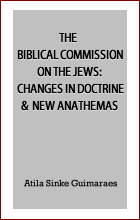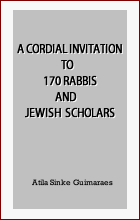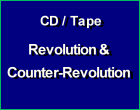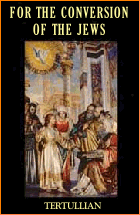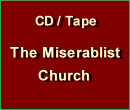Consequences of Vatican II
 |
 |
 |
 |
 |
 |
 |
Conciliar Church & Judaism - IV
New Teachings Oppose
Christ’s Goal for the Catholic Church
The prayers in the centuries-old traditional Tridentine Mass codified by Pope St. Pius V are replete with affirmations that clearly oppose the papal statements quoted in my preceding articles (here, here and here).
For example, Benedict XVI’s declaration that the Jews do not need to acknowledge that Jesus Christ is the Son Of God is contradicted in these prayers of the traditional Mass:
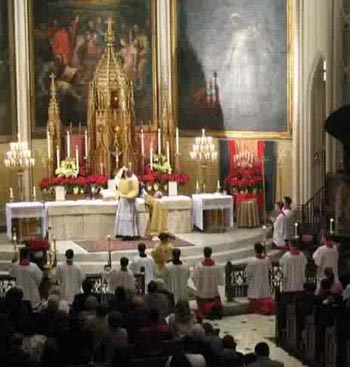 In fact, the traditional Mass, or Tridentine Mass, is a truly wondrous celebration that honors God, Jesus His Son and the Holy Ghost. Thus, by participating in its celebration, Catholics give honor and glory to the Triune God and fulfill Christ’s purpose for the existence of His Church.
In fact, the traditional Mass, or Tridentine Mass, is a truly wondrous celebration that honors God, Jesus His Son and the Holy Ghost. Thus, by participating in its celebration, Catholics give honor and glory to the Triune God and fulfill Christ’s purpose for the existence of His Church.
Because the prayers one recites express what one believes (lex orandi, lex credendi), it is obvious the tradiitonal Mass strongly confirms the immutable Catholic Faith. Since the words of the conciliar Popes, Card. Walter Kasper and the PBC publication are in direct opposition to such affirmations, they serve to explain why the conciliar Church long banished the traditional Latin Mass of Pope St. Pius V, and now, after the Summorum Pontificum, although allowing its celebration under some conditions, considers it as a second class liturgy.
Benedict XVI’s statements quoted in the preceding article afirming that the Jews do not need to accept Christ to be saved and do not need to convert, contradict de fide teachings that are the foundation of the Catholic Faith. The statements also clearly contradict the words of both Christ and His heavenly Father that I mentioned.
Since the dogma of the Faith is part of the Revelation Jesus brought and the base of the Catholic Church, such papal statements actually are pretending to correct God, who demand of man to believe in Christ and belong to the Catholic Church for the salvation of his eternal soul. This constitutes a very grave threat to the eternal welfare of the souls of the Catholic Faithful.
Far more serious is the fact that such statements by a Pope and a high ranking cardinal are in complete opposition to the very purpose for which Christ established the Catholic Church, which is to give honor and glory to God and save souls.
Canon 1325, §. 2 of the 1917 Code stated: “If a baptized person deliberately denies or doubts a dogma properly so-called, he is guilty of the sin of heresy,” and Canon 2314, § 1 stated: “Such a person automatically becomes subject to the punishment of excommunication.” (1) These two articles are still in force in the new and concessive 1983 Code (cc. 751, 1364).
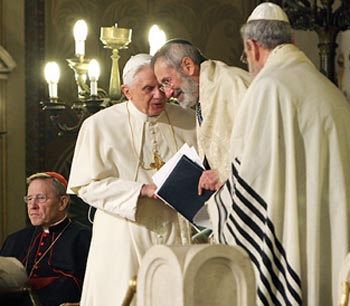 Thus, according to both the old and the new Codes of Canon Law, an individual who promotes and/or adheres to one or more of the conciliar Church’s new de facto teachings that contradict a de fide teaching or the words of Christ commits the sin of heresy and automatically excommunicates himself.
Thus, according to both the old and the new Codes of Canon Law, an individual who promotes and/or adheres to one or more of the conciliar Church’s new de facto teachings that contradict a de fide teaching or the words of Christ commits the sin of heresy and automatically excommunicates himself.
In this regard, it is important to recognize that the new conciliar Church teachings that contradict de fide teachings and the words of Christ, have not been formally declared de fide. Hence they have only the “force' of de facto teachings and may freely be either ignored or resisted.
A teaching declared to be de fide is a teaching which is an essential part of the Catholic Faith and whose denial is heresy. The behavior required of a Catholic in the face of teachings that contradict de fide teachings is well described in the subtitles “St. Thomas on Resisting Errors of Prelates” and “Other Theologians and Saints on Resisting Popes” in the article “The Duty to Resist” by Atila Guimarães. See also here, here, here and here.
What teachings of Vatican II are de fide?
To minimize the confusion created in the minds of Catholic faithful by the many new, novel and de facto post-Vatican II teachings and for the good of the eternal welfare of souls, conciliar Church authorities should do one of the following:
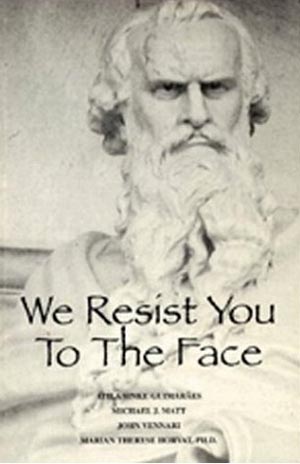 To this day, the authorities have been unable to provide this and, despite repeated requests to do so, have steadfastly refused to supply the needed definition. Such a lengthy delay implies an inability or a lack of desire to make such definitions. This delay also shows a lack of concern for the eternal welfare of the souls of both the Catholic Faithful and members of false religions.
To this day, the authorities have been unable to provide this and, despite repeated requests to do so, have steadfastly refused to supply the needed definition. Such a lengthy delay implies an inability or a lack of desire to make such definitions. This delay also shows a lack of concern for the eternal welfare of the souls of both the Catholic Faithful and members of false religions.
It is a de fide teaching of the Catholic Faith that God created man to know Him, to love Him, to serve Him and to be forever with Him in His heaven and to assist man in fulfilling God’s purpose for him. It is also de fide that His only begotten Son, Jesus Christ, established the Catholic Church for the purpose of giving honor and glory to God and enabling the salvation of souls.
Since it is God who will be the judge of the eternal welfare of all souls, the only valid criterion for evaluating a statement or action by any Catholic Church authority, including the Pope, is how well a proclamation or action agrees with the purpose for which God His Son had established His Church.
Since several of the new Jewish inspired de facto changes in the traditional Catholic Faith dishonor God as well as endanger the eternal welfare of the souls of members of any religion, the changes are in direct opposition to the purpose for which Christ established the Catholic Church and so are invalid. For the eternal welfare of souls, such changes should be either ignored or frontally resisted.

Posted September 20, 2013
For example, Benedict XVI’s declaration that the Jews do not need to acknowledge that Jesus Christ is the Son Of God is contradicted in these prayers of the traditional Mass:
- The Gloria;
- the first, second and third prayers of the Offertory;
- the Glory Be;
- the first prayer in the Canon, the prayer for the consecration of the Bread;
- the prayer following the Our Father, and others.
- The divinity of Christ; Christ is truly the Son of God;
- the existence of the Triune God;
- the equality of the Son, the Father and the Holy Ghost;
- Christ's power to forgive sins;
- Christ will judge the eternal welfare of souls;
- Jesus did ascend into heaven, and
- many statements requesting our honoring and praying to God, His Son, Jesus Christ and the Holy Ghost.

The Tridentine Mass gives honor and glory to God;
the Novus Ordo centers on man
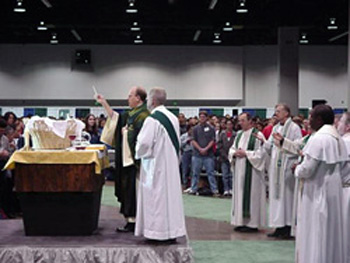
Because the prayers one recites express what one believes (lex orandi, lex credendi), it is obvious the tradiitonal Mass strongly confirms the immutable Catholic Faith. Since the words of the conciliar Popes, Card. Walter Kasper and the PBC publication are in direct opposition to such affirmations, they serve to explain why the conciliar Church long banished the traditional Latin Mass of Pope St. Pius V, and now, after the Summorum Pontificum, although allowing its celebration under some conditions, considers it as a second class liturgy.
Benedict XVI’s statements quoted in the preceding article afirming that the Jews do not need to accept Christ to be saved and do not need to convert, contradict de fide teachings that are the foundation of the Catholic Faith. The statements also clearly contradict the words of both Christ and His heavenly Father that I mentioned.
Since the dogma of the Faith is part of the Revelation Jesus brought and the base of the Catholic Church, such papal statements actually are pretending to correct God, who demand of man to believe in Christ and belong to the Catholic Church for the salvation of his eternal soul. This constitutes a very grave threat to the eternal welfare of the souls of the Catholic Faithful.
Far more serious is the fact that such statements by a Pope and a high ranking cardinal are in complete opposition to the very purpose for which Christ established the Catholic Church, which is to give honor and glory to God and save souls.
Canon 1325, §. 2 of the 1917 Code stated: “If a baptized person deliberately denies or doubts a dogma properly so-called, he is guilty of the sin of heresy,” and Canon 2314, § 1 stated: “Such a person automatically becomes subject to the punishment of excommunication.” (1) These two articles are still in force in the new and concessive 1983 Code (cc. 751, 1364).

Benedict changes the Catholic dogma to please the Jews
In this regard, it is important to recognize that the new conciliar Church teachings that contradict de fide teachings and the words of Christ, have not been formally declared de fide. Hence they have only the “force' of de facto teachings and may freely be either ignored or resisted.
A teaching declared to be de fide is a teaching which is an essential part of the Catholic Faith and whose denial is heresy. The behavior required of a Catholic in the face of teachings that contradict de fide teachings is well described in the subtitles “St. Thomas on Resisting Errors of Prelates” and “Other Theologians and Saints on Resisting Popes” in the article “The Duty to Resist” by Atila Guimarães. See also here, here, here and here.
What teachings of Vatican II are de fide?
To minimize the confusion created in the minds of Catholic faithful by the many new, novel and de facto post-Vatican II teachings and for the good of the eternal welfare of souls, conciliar Church authorities should do one of the following:
- Either demonstrate the consistency of the new changes with the traditional Catholic Faith, or
- define the “force” of their new teachings.

The Resistance Statement presents a secure stance to take in face of the post-conciliar errors
It is a de fide teaching of the Catholic Faith that God created man to know Him, to love Him, to serve Him and to be forever with Him in His heaven and to assist man in fulfilling God’s purpose for him. It is also de fide that His only begotten Son, Jesus Christ, established the Catholic Church for the purpose of giving honor and glory to God and enabling the salvation of souls.
Since it is God who will be the judge of the eternal welfare of all souls, the only valid criterion for evaluating a statement or action by any Catholic Church authority, including the Pope, is how well a proclamation or action agrees with the purpose for which God His Son had established His Church.
Since several of the new Jewish inspired de facto changes in the traditional Catholic Faith dishonor God as well as endanger the eternal welfare of the souls of members of any religion, the changes are in direct opposition to the purpose for which Christ established the Catholic Church and so are invalid. For the eternal welfare of souls, such changes should be either ignored or frontally resisted.
- See “Fundamentals of Catholic Dogma” by Ludwig Ott, p. 5 for a more complete discussion concerning Catholic dogma and its obedience

Posted September 20, 2013
______________________
______________________



